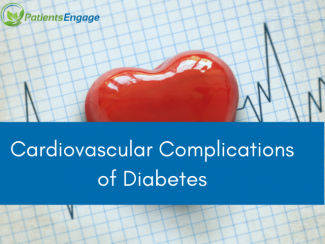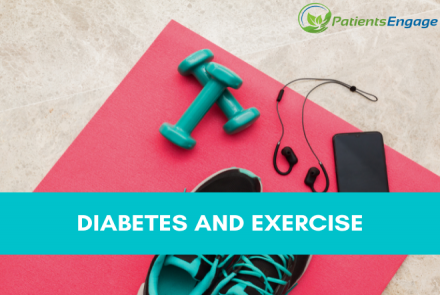
Persons with diabetes have a 2-to-3 fold higher rate of cardiovascular complications than those without diabetes. Read more about how diabetes increases the risk of complications and what can be done to manage this risk. Pro-tip: The best approach is to manage and control diabetes well.
The diabetic population is known to have a 2-to-3 fold higher rate of complications than the non-diabetic population. While it is true that diabetes increases the risk of getting numerous complications, the risk can be significantly reduced by managing and controlling diabetes well.
Complications can not only be delayed but even prevented with timely control of the disease. Diabetes can affect several organs and systems in the body and can lead to serious health consequences. The damage to the heart and the vascular system is of utmost importance because it is the number one cause of death in diabetic patients.
The cardiovascular events caused by diabetes are primarily divided into three groups:
1. Atherosclerosis
Atherosclerosis is the narrowing of the blood vessels in the body. This can be due to thickening of the vessel walls or fatty deposits along the lining of the vessels. As a result, less blood flow reaches the heart and its coronary arteries (arteries which supply the heart muscle) causing lack of oxygen to the heart muscle. This is called Coronary heart disease or Coronary Artery disease as part of the heart muscle stops functioning from no blood/oxygen supply.
Fatty plaque deposits due to high levels of bad cholesterol increases the formation of plaques or clots in the blood vessels. If a clot obstructs any of the coronary arteries, then it can cause heart attacks or myocardial infarcts. If the clot breaks off and reaches the brain, it can cause Stroke.
The stiffening of the blood vessels has a direct effect on increase of blood pressure thereby compounding the risk of cardiovascular events from sluggish blood flow. For more information on how Hypertension and Diabetes are connected, please read (link)
Signs and symptoms of Heart Attack to watch out for:
- Chest pain or tightness
- Pain on left arm, neck, jaw, or shoulder
- Heartburn or discomfort
- Difficulty breathing
- Sweating
- Tiredness
- Dizziness
- Nausea or vomiting
2. Heart Failure
Heart Failure occurs when the heart overtime become too weak from low oxygen supply to be able to function properly. The pumping mechanism of the heart is decreased with low ejection fractions and the blood that travels to all the parts of the body is lessened. Heart Failure is a chronic and progressive complication of diabetes that can lead to heart enlargement, poor volume ejection and faster heart rate.
Signs/symptoms of Heart Failure that should be identified and reported:
- Shortness of breath
- Fast or irregular heartbeat
- Nausea or vomiting
- Coughing
- Weakness
- Fatigue
- Swelling in the foot and ankles
3. Cardiac Arrhythmias
Arrhythmias are irregular heartbeats. The rhythmic beating of the heart is controlled by electric firing. Changes in the heart structure or damage (such as a heart attack or heart failure) can cause disruptions in the rhythm causing the heart to beat faster, slower, or irregularly. Changes in blood glucose levels in diabetes along with obesity (including excess fat around the heart) are found to be the main contributors for cardiac arrythmias.
Arrythmias can be managed easily but if not detected on time can give rise to more chances of stroke and sudden cardiac death.
There are 5 types of Arrhythmias that can occur- Atrial Fibrillation, Ventricular Fibrillation, Supraventricular Tachycardia, Bradycardia and Heart Block.
Symptoms of Arrythmia that should be brought to your doctor’s attention:
- Shortness of breath
- Palpitations
- Dizziness
- Fainting
How to reduce your risk?
Keep a check on your ABCs and make the correct lifestyle alterations to reduce your risk of getting cardiovascular diseases.
A = HbA1c to be below 7%
B= Blood pressure maintain normal around 120/80
C=Cholesterol, LDL levels should be less than 70
Lifestyle changes
- Stop smoking and use of all tobacco
- Reduce alcohol intake
- Cut down on salt, sugar and saturated fat intake
- Exercise regularly ( moderate workout of 150 minutes per week or intense workout of 75 minutes per week)
- Be more physically active and reduce sedentary time
- Lose weight if you are obese or overweight
- Manage your stress
- Take your medications as prescribed
Persons with Diabetes should see their doctor regularly and monitor their blood glucose, cholesterol and blood pressure levels frequently so as to avoid any complications and reduce their risk of getting a cardiovascular event. If they notice any signs and symptoms of a heart problem, they must seek medical attention immediately.
Issued as part of the public education series by Boehringer Ingelheim India and PatientsEngage
References:
Grisanti L. A. (2018). Diabetes and Arrhythmias: Pathophysiology, Mechanisms and Therapeutic Outcomes. Frontiers in physiology, 9, 1669. https://doi.org/10.3389/fphys.2018.01669
American Diabetes Association. Oct 2021 https://www.diabetes.org/diabetes/complications/cardiovascular-disease
National Health System of the UK. Oct 2021 https://www.nhs.uk/conditions/arrhythmia/















